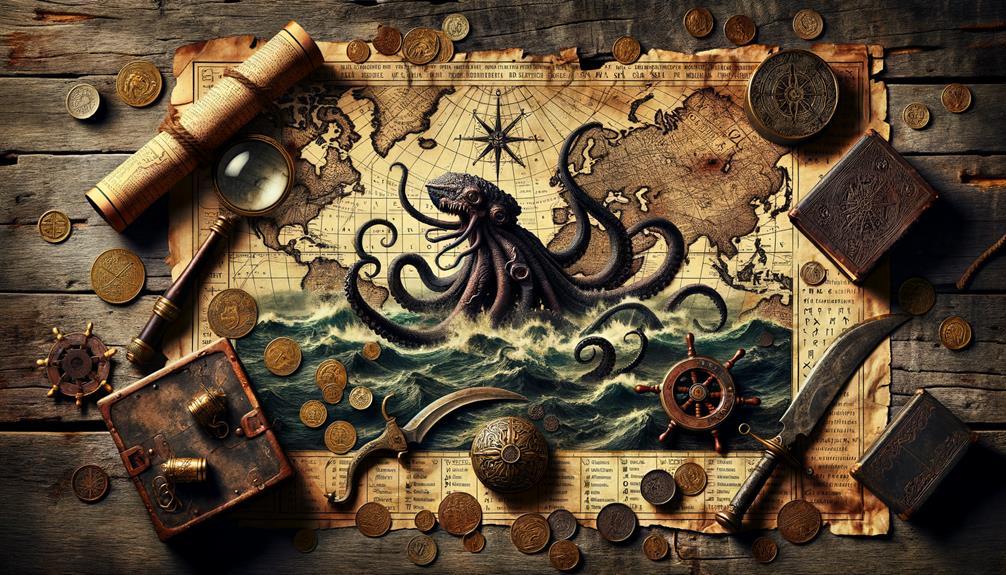The Kraken's legend is a fascinating one that has managed to capture people's attention throughout the ages. As someone who is deeply interested in mythological creatures, I've put in a lot of time examining the story of this impressive sea monster. We've seen it evolve from whispered sailors' tales to featuring in Hollywood movies.
The Kraken is a creature that was imagined out of people's fear of the unknown sea depths. What's amazing is that it has not just managed to stand the test of time, but has also found a place in scientific records. This is due to the discovery of the giant squid, which lends some truth to those old sailors' stories.
There's something compelling about the Kraken's story – how it effortlessly merges myth and reality and continues to be a part of our collective awareness. So, why don't we dive deep into this fascinating lore? It's where the boundaries between mythology and marine biology become wonderfully hazy.
Origins of the Kraken Myth

Travel back with me to the early 1700s, where the first documented mention of the Kraken arises. A man named Francesco Negri wrote about it in his travel diary. He spoke of a gigantic animal hiding in the sea between Norway and Iceland. This epic sea beast, wrapped in the tales of Scandinavian folklore, has become an integral part of maritime history.
Let's look at the genesis of the Kraken myth. The term 'kraken' comes from the Norwegian word 'krake,' which translates to malformed or overgrown, a suitable name indeed. The belief is that encounters with the giant squid, a creature of similar size, sparked this legend. These encounters were so common that King Sverre of Norway even mentioned the Kraken in his own works.
Fast forward to the 18th century, a Norwegian bishop named Pontoppidan added more details to this story. He portrayed the Kraken as an enormous octopus that could swallow entire ships. Regardless of whether it was an octopus or a squid, the Kraken continues to enthrall us. Its tale has seeped into global pop culture. Looking at these historical narratives, it's clear to see the evolution of this legendary sea monster. It went from being the stuff of sailors' nightmares to a symbol of the enigmatic deep sea.
Kraken in Ancient Literature
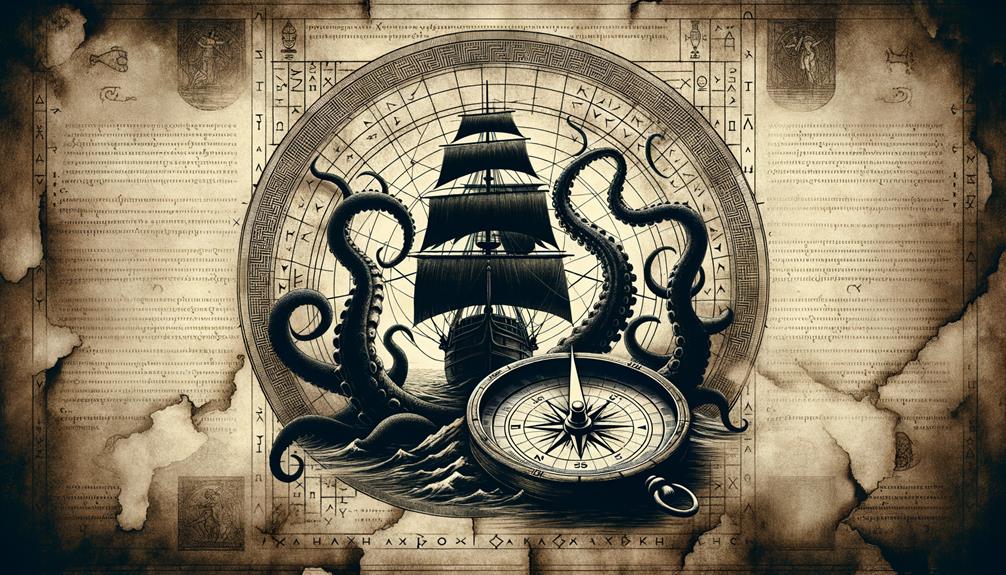
Diving into the Kraken's roots and growth, we find that its unique charm truly shines in ancient literature. Norse mythology is where the Kraken's tale is deeply entrenched, with accounts of this marine behemoth echoing through historic documents.
- *Fishermen from Norway:* They painted a picture of the Kraken as a gigantic creature, similar to an octopus, which was dreadfully known for its ability to sink entire ships. These narratives have played a huge role in shaping the Kraken's history.
- *Erik Pontoppidan:* This bishop from Denmark gave the Kraken a starring role in his records of Norway's past. He documented this sea monster alongside other marine beasts, strengthening its mythological reputation.
The Kraken in ancient literature isn't solely about terror and devastation. It's additionally a symbol of the great unknown, mirroring human curiosity and fear of the unexplored abyss. The historical tales about the Kraken, skillfully interwoven into ancient stories, keep stirring our curiosity. It just goes to show that the tales of the Kraken are as profound and lasting as the ocean it's thought to dwell in.
Cultural Impact of the Kraken
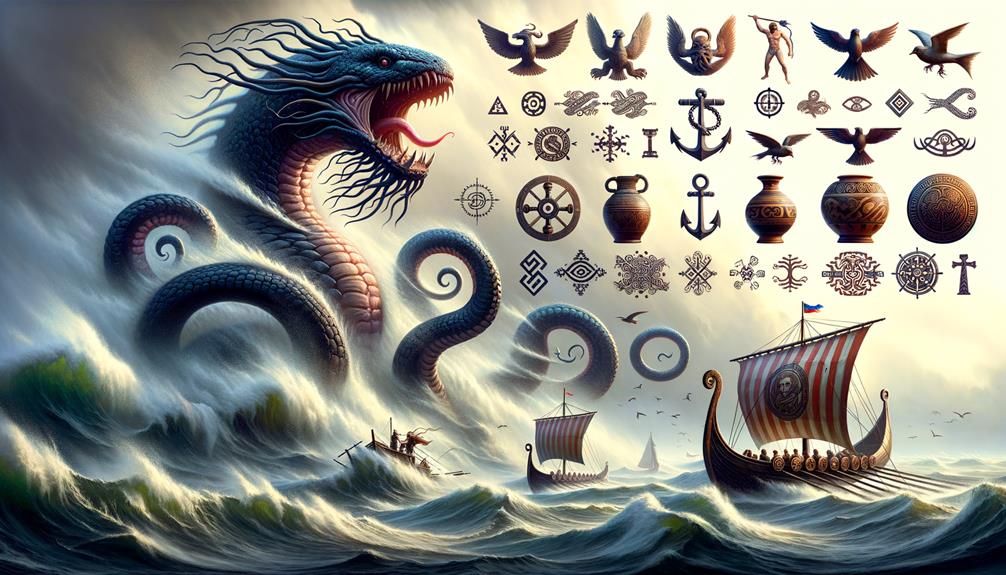
Wondering how the Kraken, a colossal sea beast from ancient Norse tales, has seeped into modern culture? This mythical creature, often imagined as a gigantic octopus or squid, has left a considerable cultural footprint. The Kraken was believed to dwell off the shores of Norway and Greenland, its home a mysterious abyss, and was feared for its attacks on ships and creation of deadly whirlpools.
The term 'kraken' has now become a catch-all for monstrous sea creatures, inspired by tales from ancient seafarers. This kraken's lore has stirred the minds of many, swaying writers, movie makers, and video game creators. It's not just the horrifying image of a giant cephalopod emerging from the ocean depths, but also the raw fear of the unknown that the kraken represents, that has left a lasting impression on our shared consciousness.
Despite its mythical roots, its continual appearance in popular culture shows the lasting allure of ancient tales and their power to resonate with deep-rooted human fears and fascinations. In this way, the cultural influence of the kraken surpasses its Norse origins, reaching to the core of our contemporary imaginations.
Kraken's Evolution Over Time
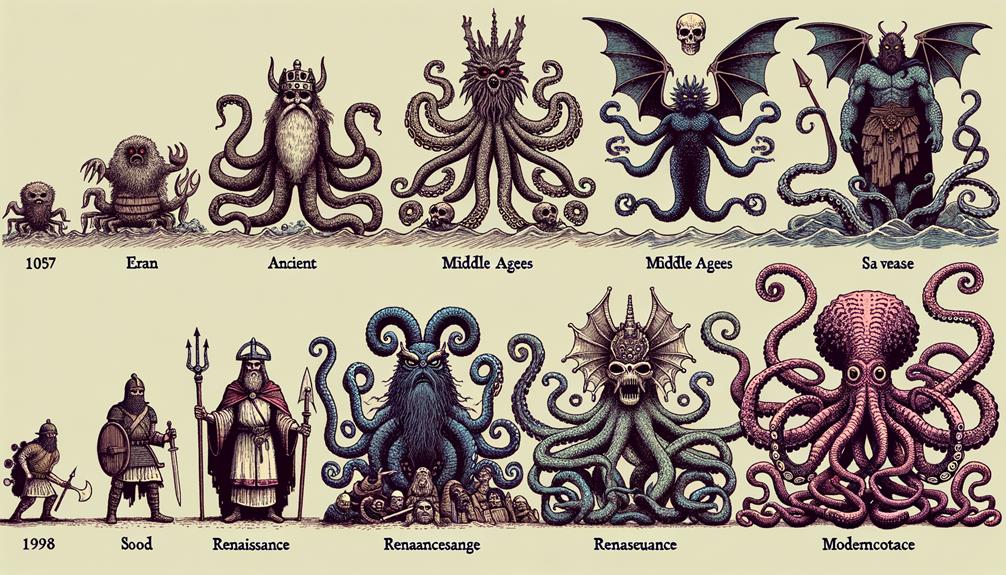
Let's talk about the Kraken, a legendary sea monster that's certainly evolved throughout history. Originating from ancient Norse tales, it has become an icon in modern pop culture. Its story intertwines with that of Norway, a nation known for its maritime traditions.
Back in the day, the Kraken was a formidable foe. It was thought to be an enormous sea-dwelling creature, infamous for attacking and sinking ships into the deep blue.
Bishop Pontoppidan, in his 'Natural History of Norway', gave credence to this terrifying image of the Kraken. His vivid descriptions etched the image of a fearsome sea beast in people's minds.
Through the ages, the perception of the Kraken has changed, possibly due to stories about massive squids. These days, it's often imagined as a giant cephalopod, a testament to its resemblance to these real-life aquatic creatures.
In simple terms, the Kraken has morphed from a dreaded seafarer's nightmare to a fascinating mix of reality and myth. Our collective fascination with the Kraken mirrors our innate desire to understand the uncharted depths of the sea. As we continue to learn more about marine life, the image of the Kraken evolves, reflecting our changing relationship with the ocean's enigmas.
The Kraken in Modern Media
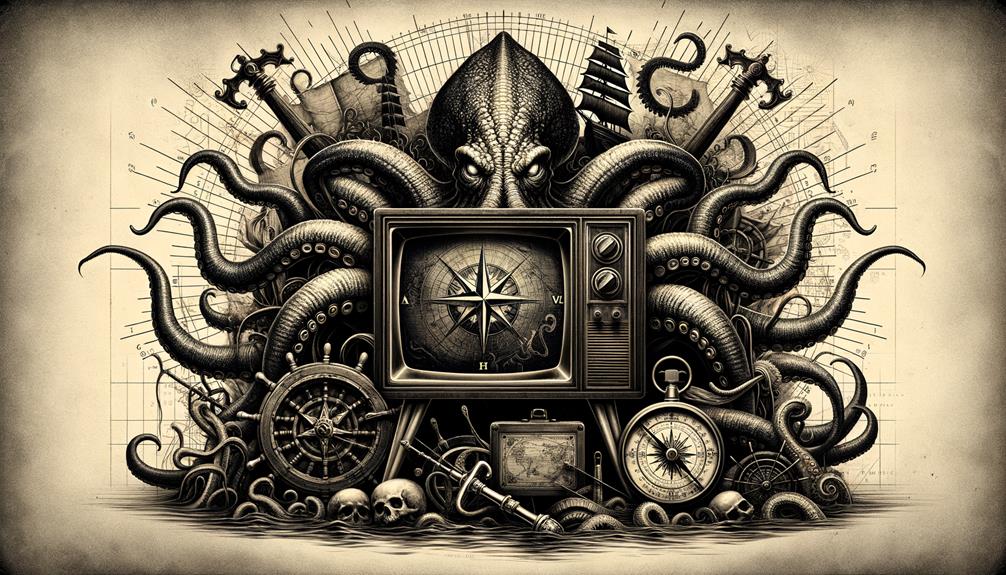
From ancient Scandinavian tales to today's entertainment industry, the Kraken has captured the world's attention. Often shown as a gigantic octopus or squid, this sea beast is said to be as big as 81 massive elephants. It's thought that real-life sightings of giant sea creatures might have sparked the original stories about the Kraken.
You can find the Kraken just about everywhere these days. It's often portrayed in books and movies, where it's seen battling ships in epic sea adventures. This symbolizes the fear that old-time sailors might have felt facing the unknown dangers of the deep sea. The creature's image varies from a sea serpent to a gigantic octopus, each interpretation adding a new twist to the legend.
Scientific studies are ongoing to learn more about giant squids, which are considered to be the real-life inspiration for the Kraken's story. Nowadays, the Kraken is more than just a symbol of maritime fear. It represents our enduring curiosity with the unknown and the terrifying. As we discover more about these amazing sea creatures, how we see the Kraken will continue to change, just like it has throughout history.
Frequently Asked Questions
What Is the Original Story of the Kraken?
I can't claim to know the entire original tale, but the general consensus seems to be that the Kraken was a colossal sea creature, perhaps a giant octopus of sorts. It was supposedly found hanging out in the sea regions between Norway and Iceland.
What Is the Greek Myth Kraken?
Contrary to what some might think, there isn't a Greek myth about the Kraken. This misconception is pretty common, but the truth is, the story of the Kraken has its roots in Norse folklore, not Greek mythology. Imagine this – the Kraken is a massive sea monster, often illustrated as a squid or an octopus. The folklore paints a vivid image of it swallowing whole ships and their crews in one fell swoop. Now that's a tale to give any sailor nightmares, wouldn't you agree?
What Are the Theories of the Kraken?
You know, I'm not entirely sure about every theory out there, but there's one that really stands out. This particular theory suggests that the legendary Kraken might actually be inspired by encounters with giant squids. Now, if you've ever heard of these creatures, you'll know they're incredibly large and decked out with a ton of tentacles. It's an interesting thought, isn't it?
Is Kraken in the Bible?
Nope, you won't find the Kraken in the Bible. This sea monster hails from Scandinavian tales and myths, rather than biblical scriptures. Nowadays, in the world of science, the idea of the Kraken has largely given way to the giant squid. Yet, this legendary creature continues to make waves in popular culture.

